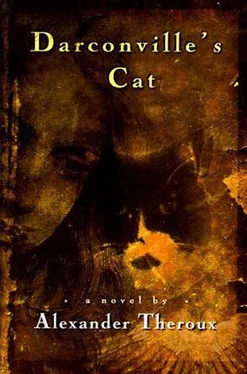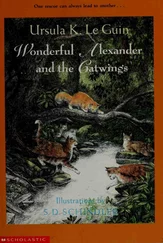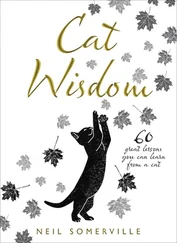Darconville passed by the refectory (and the odor of mercilessly boiled brussels sprouts) and sat down in a circular room where in the center stood a sculpture of Chapu’s Joan of Arc, the college patron. This was known as the Rotunda. The main building at Quinsy College, its egg-shaped interior was a respectable cream-and-green color, open, as it took one’s attention higher and higher past two circular balustrades, to a voluminous inner dome covered with fake but sumptuous, over-elaborate, neo-biblical murals in rose and gold. On several walls at ground level, a series of past college presidents, bald and severe, glowered out of their frames. He was still reviewing the list, empty pier-glasses, and pronouncing names, all but hers hostile to him because not hers, but yet none hostile because to him any might be.
Butone Slocum
Millette Snipes
April Springlove
Lately Thompson
DeDonda Umpton
The memory had persisted. On an otherwise unexceptional day, for the first time, he’d met that class of freshmen, silent little elves bunched-up and sitting terrible-eyed as they contemplated the four years of college to come. No one had spoken or said so much as a syllable, but all took down the assignment and then the name he’d chalked on the board by way of introduction as if they were borrowing it for some felonious purpose. And then, turning, he had seen the girl, a face out of Domenichino declaiming itself with the supremacy of a mere look that rose like an oriental sun not announced by dawn and setting left no twilight — only the persistent memory of two brown eyes, soft and fraught with soul, imparting a strange kind of consecration. Darconville, looking through the mist of his reverie, then turned from his own idle thoughts and read the last names on the list:
Shelby Uprightly
Martha Van Ramm
Poteet Wilson
Rachel Windt
Laurie Lee Zenker
“Yoo-hoo!” Halfway down the front stairs, Darconville turned back to the voice. It was Mrs. McAwaddle, scooting after him on her tiny slue feet. She was relieved she’d caught up with him, she said, puffing, her hand pressed to her heart. “I’m doing my level best to keep your classes down to a minimum, especially from those”—she handed him a piece of paper—”who have no business being there. The dean has decided to leave the matter up to you.”
The particular piece of paper, the formal request of a senior to take his freshman course, was signed by the dean and countersigned in an affected paraph of lavender ink with the name: Hypsipyle Poore .
“You remember that child out front fussing at me?” Mrs. McAwaddle shook her head. “They have nerve to burn.” And she squeezed Darconville’s hand, turned, and trundled away toward her office, one shoulder lower than the other. “Yoo-hoo!” Darconville looked up again to see Mrs. McAwaddle standing on the landing. “Be careful.”
Dear Mrs. McAwaddle, wise Mrs. McAwaddle, widowed Mrs. McAwaddle, owlish Mrs. McAwaddle, compassionate Mrs. McAwaddle, Mrs. McAwaddle in her dress of hearts! But how could she know, poor soul, that it was entirely someone else who was on his mind and to whom that stricture better applied: be careful. But of what? Of whom? For still, of the many names she could have, she had none.
Darconville, however, consigned her to the obscure and folding the class list into his pocket walked out into the lovely afternoon, the rarefactions in the air opposing, however pleasantly, his general conviction that the state of art should be in constant panic. The artistic nature, he knew, had an inborn proneness to side with the beauty that breaks hearts, to single out the aristocratic contours of what in human glory quickens the impulses of life to mystic proportions. He found himself, again, absent-mindedly thinking of the effect of that look in which everything that was most obscure in the relation between two people rose to the surface, and yet he could find no possible expression of it in words. But curiosity, he thought — the weakest form of solicitude, even if it was the beginning of it — was not love.
And crossing the lawn he only hoped that he’d gain somehow in veracity what he lost in mystery — a compromise, it also occurred to him, he wasn’t always ready to make. But what was he ready for? He didn’t know. And so laughing he headed home, walking without so much as a touch of regret up the street to his house, his book, and the supra-mundane.
Exercise indeed we do, but that very forebackwardly,
for where we should exercise to know, we exercise as having known.
— Sir PHILIP SIDNEY, Defence of Poesy
IT WAS TOO EARLY to rise. But Darconville, long before dawn, couldn’t refrain from literally jumping out of bed, the excitement in the sense of well-being he felt serving as the best premonition possible for a full, uninterrupted day of writing, and when the sun bowled up over Quinsyburg — which Spellvexit, somersaulting, always greeted with a glossoepiglottic gurgle of joy, something like: “Gleep!”—he welcomed its appearance with three finished pages and an emphatic resolve to write a few more.
After his coffee, he smoked awhile, and then set to work again, his desk cluttered with notebooks, pens, and piles of paper. The skull, norma frontalis , was even smiling its approval this morning, for before long Darconville was fully re-engaged in that silent and solemn duel in which the mind sits concentrated in the most fearless of disciplines, the tidiness of which, he felt, life could never hope to emulate and the wonderful and deep delight of which nothing whatsoever else could hope to match. It was worth the loneliness. It was worth the time. And if the blazing rockets of his imagination came whistling down mere sticks, as occasionally they did, it was worth it still, for truth indeed was fabulous and man, he’d always thought, best knew himself by fable.
Was truth, however, discovered or constructed? Darconville, actually, was never really sure, and, of so-called “experience,” well, when he thought of it he tended to believe that it had to be avoided in order to write — a matter, in fact, that couldn’t have been given clearer focus than during these last few weeks in Quinsyburg when up in those rooms, conjugating the games of speech and light, writing pages racily colloquial, classically satirical, stinging and tender in robust and ardent sequence, be had been interrupted with a frequency that almost bordered on devotion: students-in-crisis; evangelists — two ruby-nosed Baptanodons, especially, whose particular theory of disputation was that one should aim, not to convince, but rather to silence one’s opponent; and even several locals who knocked to inquire, alas in vain, about the possibility of buying his car, the black 1948 Mark VI Bentley in front of the house whose tires they invariably kicked, crying, “What a mochine!” So he had his telephone pulled out. He kept his shades pulled. He locked his door. And the Lords of Pleroma stood by.
When not teaching, Darconville worked very hard on his manuscript and, in doing so, was entirely free from any feeling of having committed sacrilege against the vow he had made with himself before coming there. His was a kind of asceticism. The writer was not a person, Darconville felt, rather an amanuensis of verity, who would only corrupt what he wrote to the extent, that he yielded to passion or shirked the discipline of objectivity.
The noon bell sounded from the library clock, work continued, and before too long it was midafternoon, reminding him quite poignantly of how slow the imaginative struggle was — for were not artists those few of us flung down from the heavens into mortal garments? — and how difficult it was to return. To do, however, was not necessarily to make, nor to shape, to shape correctly. A maniacal stylist, Darconville worked to shape what he wrote — contour of form with respect to beauty, coherence of matter with respect to blend — and to dig in matter the furrows of the mind, for in all creation matter sought form, form matter, and that was as profound an exhortation to the artist as any: form matter! The Greeks, he reminded himself, designated the world by a word that means ornament, koruos [greek], and the Romans gave it the name of mundus for its finish, its grace, its elegance. And caelum ? The word itself meant a tool to engrave!
Читать дальше












